I read all those Trump tell-alls. Here's what I learned
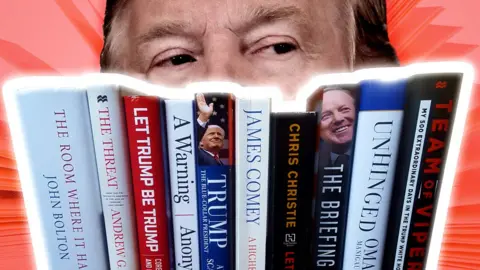 BBC
BBCHardly a day goes by without another book about the Trump White House - by a devoted former aide or a disgruntled ex-employee. Together, what do they tell us about the man?
"Has there ever been a presidency like this?" the author of one of the many, many books about President Donald Trump is asked. "I assured him there had not," was the reply.
Trump, the high-profile businessman and reality star who upset the odds to become president, was always going to be a popular literary subject.
And those books keep on coming.
This week alone saw headline-making additions to an already creaking bookcase from veteran journalist Bob Woodward and Trump's ex-lawyer Michael Cohen.
There have been blockbuster works from reporters, family tell-alls and there is a whole industry of pro-Trump books from conservative authors.
But this round-up focuses on works by those who worked with Trump either during the campaign or in the White House.
It is a long cast list:
- John Bolton, Trump's former national security adviser, who was either fired or quit, depending on what version of events you hear. Trump called him "one of the dumbest people I've met in government"
- James Comey, the former FBI director controversially fired by Trump. He is not a fan of Trump, who in return calls Comey a "sleazebag". His work has the unusual index entry "Trump, Donald J. Attempted hug by".
- Andrew McCabe, a former FBI deputy director who was fired by the Trump administration soon after Comey. Trump called him a "major sleazebag"
- Anthony Scaramucci, who had a mayfly-like run as communications director in 2017. His book is supportive of Trump but "The Mooch" has since become a critic (Trump: "A loser who begged to come back")
- Sean Spicer, who resigned as Trump's press secretary when Scaramucci was appointed. He doesn't bear a grudge against the president in his book
- Sarah Sanders, Spicer's successor until July last year. She remains loyal and Trump has called her a "warrior"
- Chris Christie, the first governor to endorse Trump in 2016. He headed his transition team but was removed, reportedly on the orders of Trump's son-in-law Jared Kushner. He is said to be helping Trump prepare for the debates in this year's election
- Omarosa Manigault Newman, a contestant on The Apprentice when it was hosted by Trump before later joining him on the campaign and at the White House. Trump says she was "despised by everyone"
- Anonymous, an author who calls themselves a "senior Trump administration official". Their identity remains unknown but they've promised to come forward this year. Trump says he already knows who they are, and has called them a "fraud"
- Corey Lewandowski, Trump's first campaign manager during his presidential run, and deputy campaign manager David Bossie, who together give a positive account of the bid
- Cliff Sims, a conservative journalist who served as a communications aide. Of all the titles his books can neither be dismissed as a hatchet job or a hagiography. Trump called him a "mess" and a "low level" staffer. There was a legal dispute between the two but he's reportedly back onside.
The books are by their very nature partial, and given the accounts often depend on reports of private conversations, we only have the author's word to go on that they took place. Those writing sympathetically have been painted as apologists looking for a way back in, while the critical writers have been accused of holding a grudge.
But taken together, what do you get?
'I need loyalty. I expect loyalty'
Whatever the author's final verdict of Trump is, there is a major recurring theme.
"Donald Trump has a fierce code of loyalty," writes Spicer. "Nothing hurts him deeper than when someone he trusts is disloyal," says Lewandowski and Bossie. "Loyalty was the key factor" in appointments, Bolton says.
Cohen, in Disloyal, and Comey, in A Higher Loyalty, build their titles around this concept.
Comey's book - part memoir, part leadership study, part expose - hints at the moment Trump reportedly told him "I need loyalty. I expect loyalty," when Comey was FBI director. Comey says he refused. He did not last much longer in his job.
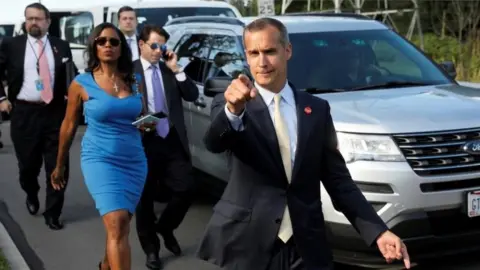 Reuters
ReutersIn Trump's world loyalty is the currency that decides who survives and who has the ear of the president. Sometimes, it spills into policy. In his account of the Trump administration's dealings with Venezuela, Bolton quotes Trump as saying of opposition leader Juan Guaidó: "I want him to say he will be extremely loyal to the United States and no one else."
But for most loyalty in Trump's world is a one-way street. As Sims notes in the final chapter of his book: "I had let my personal relationship to the president blind me to the one unfailing truth that applied to anyone with whom he didn't share a last name: we were all disposable."
The 'unicorn' president
A demand for loyalty is partly why several authors compare Trump to a mob boss. At least when Comey and McCabe do it they have some authority, having spent their careers in law enforcement.
He got off lightly with that particular comparison. To Anonymous, Trump is like a "12-year-old in an air traffic control tower". Comey says his leadership is a "forest fire". Omarosa, whose book even by Trump memoir standards takes few prisoners, calls him "a racist, a bigot and a misogynist".
In his corner Trump can count on Christie, who says he was "everything I was - but on jet fuel". Most memorably of all, Spicer says Trump is "a unicorn, riding a unicorn over a rainbow".
Life with the president. The good...
There is a very little common ground in the books between what Trump's supporters and his detractors say about his character. To the admiring voices he is a man of charisma, sharp instinct and political skill. To them his unique speaking style - while occasionally exasperating - is a gift.
Trump "knew how to speak to the people", says Lewandowski and Bossie.
Spicer quotes his father as saying: "Many candidates say something like, 'I will fight for policies that will create a better economy,' while Trump says 'I'm going to get your job back."
Elsewhere, "of all the character traits that Trump most liked to tout about himself, the boasts about his 'energy' and 'stamina' were the most undeniably true," Sims says, a point others make too and one which goes some way to explain why lethargy is a favourite angle of attack for Trump against his opponents.
No one says that there is a radically different side to Trump when the cameras are switched off - Sims says "there isn't really a private version" of him.
But there are stories of him letting his guard down, such as, for once, going quiet on election night as news of his win came in (Christie). Others talk about phone calls offering condolences after the deaths of loved ones, his affection for his family or warmth for US military members. In Sanders' telling, Trump meets a soldier while on a Christmas visit to Iraq. "A member of the US Army told him he re-joined the military because of him, and the president said: 'And I am here because of you.'"
... and the bad
Put it this way - it is only Spicer who talks about unicorns. Omarosa says Trump has a "total lack of empathy, which is itself a function of extreme narcissism". McCabe calls him the "most prolific liar I have ever encountered".
Anonymous describes Trump as ignorant, intellectually lazy and with such a short attention span all but impossible to brief. One adviser in the book says the president's demands fall into three categories - the "flat-out stupid", the "impossible to implement" and the "flat-out illegal". Until we know who the author is, though, there will always be question marks over the book's contents.
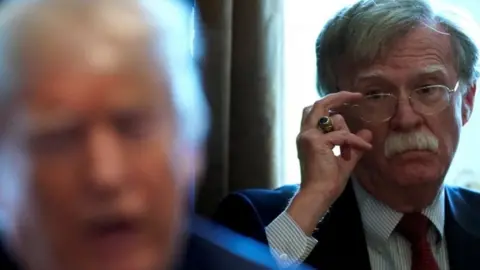 Reuters
ReutersLess easy to dismiss is Bolton's book, who is the most senior figure yet from the Trump administration to write their memoirs. His role as national security adviser gave him a seat at the table and a say in some of the most important events in the Trump presidency.
In his book Bolton says Trump sought help from Chinese President Xi Jinping to win re-election, by urging China to buy agricultural products from farmers in key states. Later in the book Bolton says Trump "couldn't tell the difference between his personal interests and the country's interests".
There are several examples of Trump cosying up to authoritarians: Bolton says he had a habit of giving "personal favours to dictators he liked", and was easily manipulated by them. He describes a letter from North Korean leader Kim Jong-un as like it had "been written by Pavlovians who knew exactly how to touch the nerves enhancing Trump's self-esteem" and at one summit "not looking forward" to leaving him alone with Russia's Vladimir Putin.
To Sims "everything was personal to Trump - everything. In international affairs, he believed his personal relationship with foreign leaders was more important than shared interests or geopolitics." Sims sees Trump as a man of "extraordinary talents and stunning shortcomings".
Trump pushes the button
With apologies to the authors, who use their books to also tell of motherhood, their professional achievements, or to quote the founding fathers, it is hard to resist not reducing each to one stand-out anecdote.
In Omarosa it is the moment Trump asks if he can swear-in to office using a copy of the Art of the Deal. She says "he wanted me to believe he was kidding".
Sanders describes the moment the US president tried to help out North Korea's Kim improve his oral hygiene.
"As the lunch was starting the president offered Kim a breath mint. 'Tic Tac?' Kim, confused, and probably concerned it was an attempt to poison him, wasn't sure how to respond. The president dramatically blew into the air to reassure Kim it was just a breath mint."
Read more:
But the capo di tutti capi, the one-anecdote-to-rule-them-all, goes to Sims, who says that a small wooden box with a red button inside can often be found on the president's desk in the Oval Office.
"If Trump noticed someone glancing at the box... he would pick it up and move it further away from himself. 'Don't worry about that,' he'd say. 'No one wants me to push that button.'"
"Guests would laugh nervously and the conversation would continue, until several minutes later Trump would suddenly move it closer to him without actually saying anything about it. Then, later in the conversation, out of nowhere, he'd suddenly press the button. Not sure what to do, guests would look at one another with raised eyebrows. Moments later, a steward would enter the room carrying a glass filled with Diet Coke on a silver platter, and Trump would burst out laughing."
On fashion and culture
Trump is often photographed wearing his tie unusually long, with the tip dipping below his waist line. The reason, according to Christie, is that he believes it makes him looks thinner.
As for that famous shock of hair, Sims says he always carried a can of hairspray in his pocket should the presidential coiffure need a touch-up.
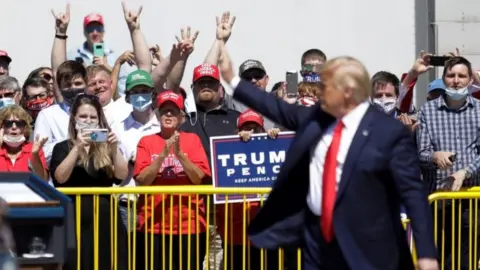 Reuters
ReutersThere is a tanning bed in the White House for the president's use, Omarosa says, who also alleges that an usher was fired as Trump didn't approve of her "handling" of it.
Elsewhere we read that Trump thinks that November Rain by Guns N' Roses is the "greatest music video of all time" (Sanders) and was obsessed with sending a CD of Elton John's Rocket Man to North Korean leader Kim Jong-un (Bolton).
Beyond briefing documents and newspapers, the president is not described as a keen book reader. Scaramucci, though, names All Quiet on the Western Front as Trump's favourite, while Lewandowski / Bossie say Swiss psychologist Carl Jung's autobiography is another one liked by the president.


Why We Serve
For those who worked for Trump but later turned on him, why did you stick with him?
For Omarosa it was a matter of loyalty, even, amongst other criticisms, as she felt that as a black woman working in an administration low on diversity she offered political cover.
For others there is a sense the loyalty was towards the Republican party, and an agenda, rather than the president himself. Partisanship shouldn't be underestimated. As Sanders puts it, about joining the campaign: "It was going to be Trump or Hillary - help save the country or let it go to hell."
Bolton says he knew of the "risks in store", but felt he could handle it. The two were something of an odd couple - Trump vowed to stop "endless wars" yet appointed a man of whom he reportedly said has "never seen a war he doesn't like". Bolton's time in the administration saw aggressive policies against Iran, Venezuela and others. His regret is that they weren't aggressive enough.
Mistakes were made (but not by me)
In the grand tradition of memoirs, errors are acknowledged then the responsibility dodged.
The Trump campaign and White House comes across as extraordinarily fratricidal. Most of the books, particularly from Trump staffers, include lengthy attacks on other Trump staffers. Some argue the wrong people in the wrong job explains some of the missteps, rather than the buck stopping with the president.
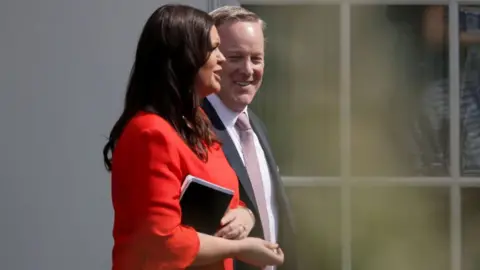 Getty Images
Getty ImagesOn arriving at the White House, Bolton is warned by then chief of staff John Kelly "this is a bad place to work, as you will find out".
Spicer and Sanders attack the press. Trump has "never received anywhere near the appropriate credit from the mainstream media for his successes", as Spicer says.
There's also a sense of Trump's officials holding back at key moments. Bolton at several points says he considered resigning but in his telling it took a dressing down over collapsed talks with the Taliban that was the final straw.
Both Comey and McCabe describe and regret times they did not stand up to him. Recounting a "bizarre" meeting, in which the president asked him who he voted for, McCabe asks himself: "Should I have been more confrontational? .... Even when it's Donald Trump it is still President Trump. So the reflex, the automatic response I felt from the deepest part of myself, was to be respectful and responsive."
Lessons for this year's vote
These books aren't the obvious place to find predictions of how November will pan out. Notably lots of them begin with the author being fired or resigning, so they can't claim to have the ear of the White House. You do get a hint or two though.
Rallies have a central place in Trump's world, as a source of energy and an instant focus group for him to sharpen his message. That stunning win in 2016 is one he wants to repeat - and one he wants to savour.
"I'd sense the tension I believe nags Trump the most, at least subconsciously: nothing about being president has ever reached the high of becoming president," says Sims.
The title and theme of Lewandowski / Bossie's book, Let Trump Be Trump, allude to their portrait of a man who is not going to change, and nor should he, they say, given his success last time.
With Joe Biden still enjoying a lead in the polls, perhaps the best lesson comes from Christie, who Trump defeated on the way to victory in 2016.
"As someone who ran against him, I know this much: underestimate him at your peril."
